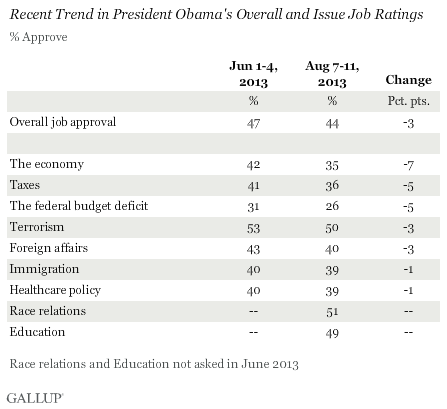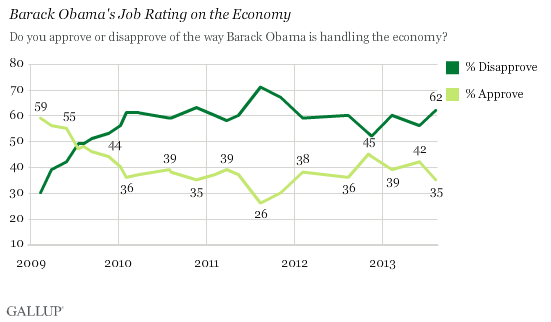PRINCETON, NJ -- Despite President Barack Obama's renewed focus on the nation's economy this summer, he scores worse with Americans on the economy than he did in June. His approval rating on the issue, now 35%, is down seven percentage points, and his ratings on taxes and the federal budget deficit are each down five points. During the same period, his overall approval rating is down three points.

In fact, out of seven issues for which Obama's job performance was rated in the new poll and in June, only the three economy-related ones fell significantly. These are also his lowest issue approval ratings of the nine total issues measured this month. Notably, these declines somewhat parallel the slide Gallup has seen in Americans' economic confidence over the same period, although confidence picked up slightly this past week.
Obama's approval ratings on race relations, terrorism, and education remain positive on balance, with each changing little since Gallup last measured them. His approval ratings on foreign affairs, immigration, and healthcare policy are all moderately negative but little changed.
The latest results are from Gallup's Work and Education survey, conducted Aug. 7-11.
Between the June and August surveys, Obama's overall job approval rating dipped three points, from 47% to 44%. While this is not large enough to be statistically significant, it is consistent with the four-point decline shown separately in Gallup Daily tracking, from 48% in the first week of June to 44% in the first week of August. Hence, it seems clear that Obama's approval rating has sagged a bit this summer, a finding that could be linked with the larger declines in his economic performance ratings.
Economy Rating Still Better Than Summer 2011
While Obama's job rating on the economy is down from June, and on the low end of the range Gallup has recorded since 2012, it is still better than the 26% it fell to in the summer of 2011. That period represents a recent low point for Americans' views of both Washington leaders and the economy, owing to the clash between Obama and the Republicans in Congress over raising the federal debt ceiling in July 2011.

Bottom Line
It may be summer, but Americans are not all smiles and sunshine, at least when it comes to their ratings of Washington leaders. Gallup's August polling finds Americans' scant approval of Congress remaining low at 14% this month, while their satisfaction with the direction of the country slipped six points to 22%, the lowest since March. In this context, it is not surprising that Obama's overall job approval rating is at a low ebb for the year.
What's more notable is that, despite ongoing debates about immigration policy, implementation of the Affordable Care Act, and Obama's approach to race relations in the wake of the verdict in the George Zimmerman trial, Obama's ratings on those issues are largely unruffled, while his ratings on the economy have suffered. Obama in turning to economic matters thus has his focus in the right place; but until the economy makes more impressive gains, ultimately reflected in improved economic confidence, Americans may not reward him with higher approval.
Survey Methods
Results for this Gallup poll are based on telephone interviews conducted Aug. 7-11, 2013, with a random sample of 2,059 adults, aged 18 and older, living in all 50 U.S. states and the District of Columbia.
For results based on the total sample of national adults, one can say with 95% confidence that the margin of sampling error is ±3 percentage points.
Interviews are conducted with respondents on landline telephones and cellular phones, with interviews conducted in Spanish for respondents who are primarily Spanish-speaking. Each sample of national adults includes a minimum quota of 50% cellphone respondents and 50% landline respondents, with additional minimum quotas by region. Landline and cell telephone numbers are selected using random-digit-dial methods. Landline respondents are chosen at random within each household on the basis of which member had the most recent birthday.
Samples are weighted to correct for unequal selection probability, nonresponse, and double coverage of landline and cell users in the two sampling frames. They are also weighted to match the national demographics of gender, age, race, Hispanic ethnicity, education, region, population density, and phone status (cellphone only/landline only/both, and cellphone mostly). Demographic weighting targets are based on the March 2012 Current Population Survey figures for the aged 18 and older U.S. population. Phone status targets are based on the July-December 2011 National Health Interview Survey. Population density targets are based on the 2010 census. All reported margins of sampling error include the computed design effects for weighting.
In addition to sampling error, question wording and practical difficulties in conducting surveys can introduce error or bias into the findings of public opinion polls.
View methodology, full question results, and trend data.
For more details on Gallup's polling methodology, visit www.gallup.com.
